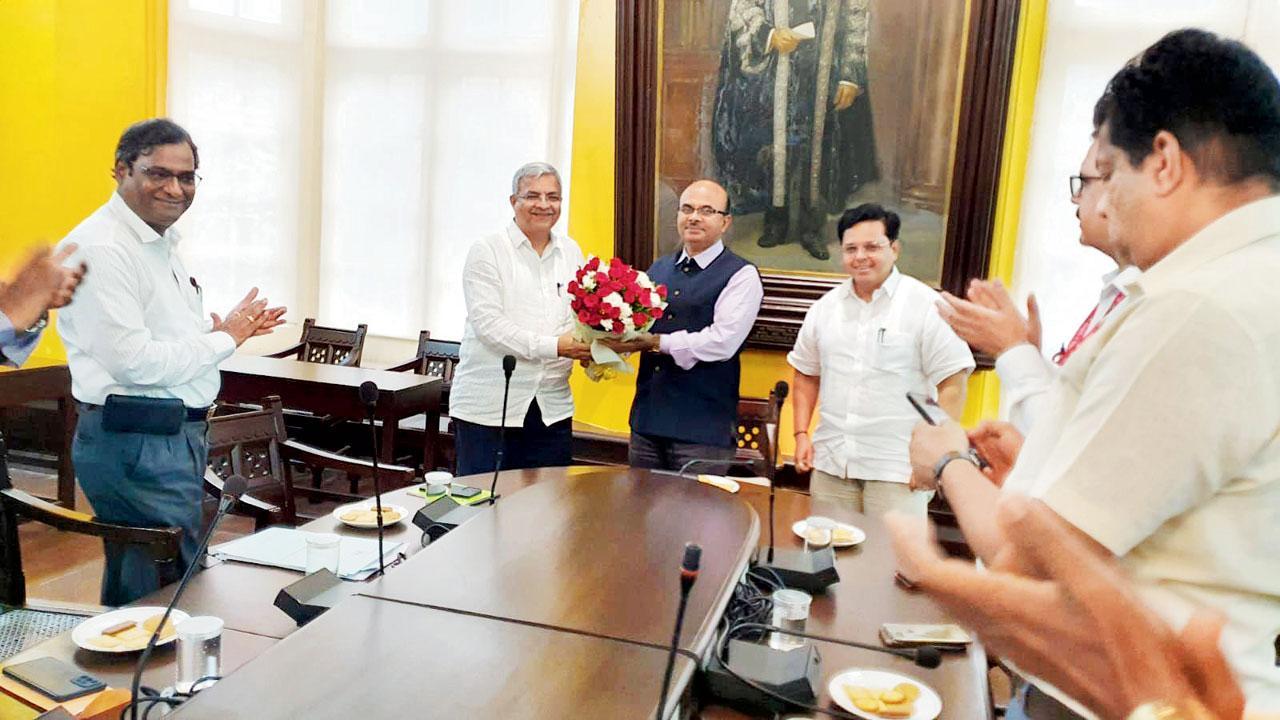Dr Ajay Bhamare, in-charge Pro-VC of the University of Mumbai, talks of the challenges before him

Dr Ajay Bhamare (left) is welcomed by MU interim VC Dr Digambar Tukaram Shirke
Governor Bhagat Singh Koshyari recently appointed Dr Ajay Bhamare as in-charge Pro-VC of the University of Mumbai. The appointment comes after the Vice-Chancellor (VC) of Shivaji University, Kolhapur Dr Digambar Tukaram Shirke was appointed as interim VC of the Mumbai University. Even as the search for a new full-time VC has just begun, Bhamare took charge as Pro-VC on Monday.
ADVERTISEMENT
Bhamare was the principal of Ramanand Arya DAV College in Bhandup. He has served in several important positions at Mumbai University. He was also chairman of the Board of Studies, dean of its faculty of Commerce and Management and a member of the Senate, Management Council and Academic Council of the university. He was also designated assessor of the National Assessment and Accreditation Council (NAAC) and a member of the Rashtriya Uchchatar Shiksha Abhiyan (RUSA), Maharashtra.
In his capacity as Chairman of the Board of Studies, Bhamare was known to have initiated an ambitious programme to revise and upgrade the commerce and business management syllabi of the Mumbai University—which has over 800 affiliated colleges—to align them with the changing needs of business and industry.
In an interview, Dr Bhamare talked about the challenges he faces, and the immediate tasks before him.
What is your priority as the new Pro-VC of the Mumbai University?
It is to utilise my decades of experience in higher education to contribute to the upgradation of this sacrosanct institute along with other stakeholders. The focus will be on implementing the National Education Policy (NEP). Moreover in the post-COVID era, the academic calendar and teaching-learning and evaluation of the university are getting restored to normality.
What are the challenges?
I am looking forward to the completion of all pending issues. Of course, there are many challenges before me such as holding elections of all bodies and authorities ie the senate, management and academic council, board of studies, etc. There is also implementation of Academic Bank of Credit (ABC). The focus will also be on revision and upgradation of the curriculum as per NEP under the guidance of the VC. We are also exploring tie-ups with many US universities. We are promoting the newly established Sindhudurg sub campus through support from the government of Maharashtra for tourism-related courses.
Mumbai University today has the highest number of affiliated colleges and former VC Dr Rajan Welukar had proposed appointing multiple Pro-Vice-Chancellors. Is there a need for decentralisation of the university for its smooth functioning?
Instead of commenting on the old proposal, I would like to highlight that there is no provision for appointing four pro-VCs under the Maharashtra Public Universities Act, 2016. Further, this issue does not fall under the purview of the university, only the state government can take a decision on such things. Also, as per Maharashtra University Act 2016, sub campuses serve the purpose of decentralisation of academic and administrative work. Thane, Ratnagiri and now Sindhudurg sub campuses are working to support the decentralisation mechanism.
Do you think this university ranking process is important? And what areas would you want the varsity to improve with respect to rankings?
Mumbai University has shown good progress compared to the previous few years. We have improved in the National Assessment and Accreditation Council and the National Institutional Ranking Framework. However, there is still more scope for improvement with respect to rankings, especially in research, consultancy and perception, etc. We are striving for research progress in terms of research and development projects, consultancy and peer perception. Through support of the Rajiv Gandhi Science and Technology Commission, the government of Maharashtra, we are exploring R & D Projects to tap resources of the Konkan region for preservations and value additions.
Do you think the various associations and unions working within the university today have been hampering its work?
I won’t say hampering. It is the responsibility of all stakeholders to contribute towards the improvement and upgradation of the university from time to time.
 Subscribe today by clicking the link and stay updated with the latest news!" Click here!
Subscribe today by clicking the link and stay updated with the latest news!" Click here!







